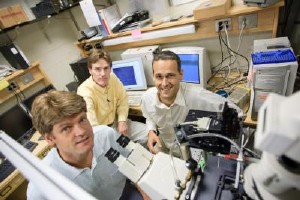Oct 7 2008
Researchers at Wake Forest University are using nanotechnology to search for new cancer-fighting drugs through a process that could be up to 10,000 times faster than current methods.
 Wake Forest University physics professors (from left to right) Martin Guthold, Keith Bonin and Jed Macasko work in Guthold's laboratory on development of Lab-on-Bead processing, a novel drug-screening technique with the potential to be 10,000 times faster than current methods. Credit: Wake Forest University/Ken Bennett
Wake Forest University physics professors (from left to right) Martin Guthold, Keith Bonin and Jed Macasko work in Guthold's laboratory on development of Lab-on-Bead processing, a novel drug-screening technique with the potential to be 10,000 times faster than current methods. Credit: Wake Forest University/Ken Bennett
The "Lab-on-Bead" process will screen millions of chemicals simultaneously using tiny plastic beads so small that 1,000 of them would fit across a human hair. Each bead carries a separate chemical, which can be identified later if it displays the properties needed to treat cancer cells. One batch of nanoscopic beads can replace the work of thousands of conventional, repetitive laboratory tests.
"This process allows the beads to do the work for you," explains Jed Macosko, project director and assistant professor of physics at Wake Forest. "By working at this scale, we will be able to screen more than a billion possible drug candidates per day as opposed to the current limit of hundreds of thousands per day."
Other members of the research team at Wake Forest include co-principal investigator Martin Guthold, an associate professor of physics, and Keith Bonin, department chair and professor of physics.
Macosko said the team and their collaborators at the University of Waterloo in Ontario, Canada, are developing a device that will automate the Lab-on-Bead process and permit parallel processing to attain faster screening results. The Wake Forest researchers are also working with biotechnologists at Harvard University in Boston and Université Louis Pasteur in Strasbourg, France, which are providing the chemicals being screened for drug candidates. Biotech company NanoMedica has shown interest in commercializing the process. The North Carolina Biotechnology Center, a private, nonprofit corporation funded by the N.C. General Assembly, has provided $75,000 in funding for the project.
Wake Forest's Center for Nanotechnology and Molecular Materials, which maintains ongoing research programs in the areas of health and medicine, energy technologies and synthesis of nanomaterials, will facilitate some elements of Lab-on-Bead development.